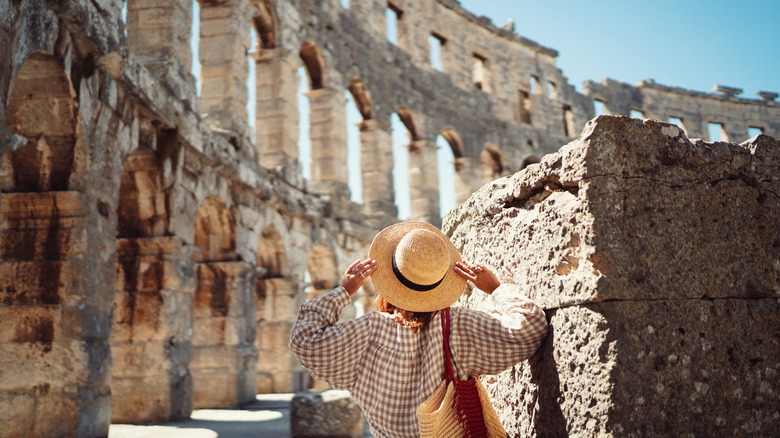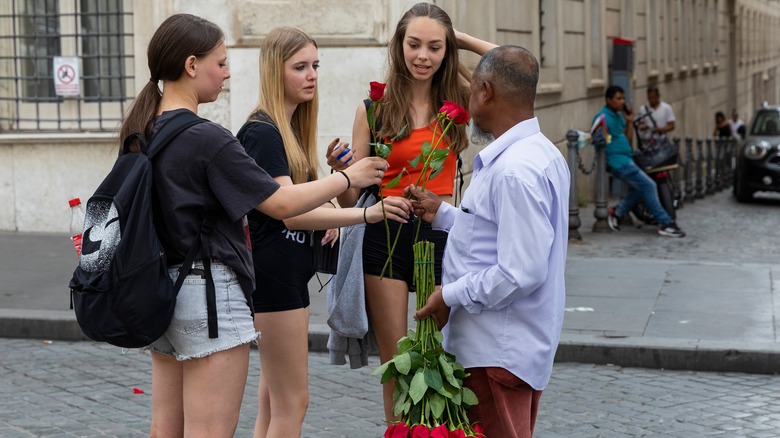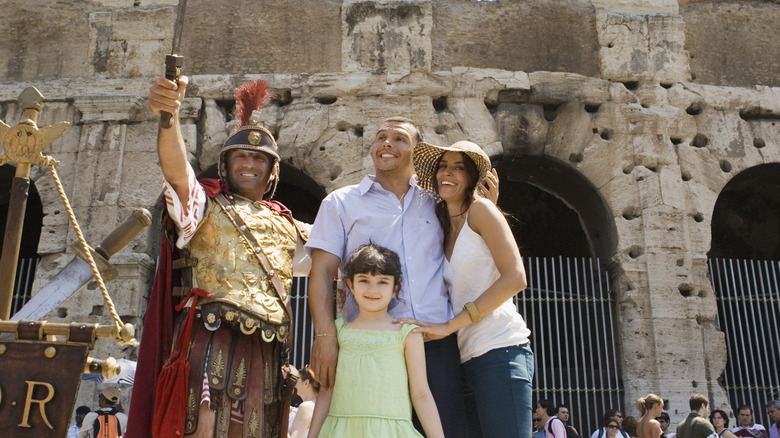The Seemingly Free 'Gift' You Should Not Accept While In Italy
You're on vacation in Rome. It's a dream trip, and after saving up for months and taking that long flight, you feel wonderful. You've been sightseeing all day, and you and your partner have just settled down at the loveliest outdoor table for some Caprese salad and bucatini all'Amatriciana with some wine. As you're chatting away about your day so far, a man approaches and offers you a rose, calling it a "gift." He addresses you as "bella," or "beautiful," and says you deserve a rose. Flattered, you take it, laughing with your partner about how friendly the Italians seem to be. Suddenly, he demands that your partner pay him money for the rose. You both feel bad after engaging with him in such a friendly manner, and one of you feels obligated to give him a few euros. You've been scammed.
This is a pretty frequent ploy to separate you from your money, and it can happen anywhere tourists gather, like outside the Parthenon in Athens or Times Square in New York. Here's all you need to know about the rose scam and other similar shady tactics before you head out to the Eternal City.
The rose scam and similar tactics
The rose scam doesn't just happen to couples. It can also happen with a group of women traveling together. Everyone is laughing and enjoying the "gift" from a friendly local when they're suddenly confronted with a sharp turn in the conversation and a demand for money. It's natural to want to keep the tone light. You may wonder if you legally have to pay this vendor, and it just seems easier to give them a bit of money to go away, so you can continue your day. That's exactly what they're counting on.
There are different versions of this scam, as one traveler wrote on a message board on travel expert Rick Steves' website. This person wrote in 2014, "I had almost the exact same scenario at the Trevi Fountain several years ago with my then 9 yr old son, except it was a toy instead of a flower. Annoyed me to no end that they would prey on children. I felt like the whole time we were in Rome it was a constant battle."
Here's another common scenario. Someone may come up to you outside the Roman Forum and compliment your shirt or tell you that you look like a Botticelli painting. You start chatting with this friendly person when you notice they're holding a bunch of bracelets. Then this new friend tells you they're down on their luck, and it would really help them out if you could just give them any spare change you have in exchange for the bracelet.
How to avoid this scam and others
You'll see the same thing at the Colosseum, where people dressed as gladiators take a picture with you and then demand money for it. Or another scenario where a "friendly local" appears to try and help you in some way, like offering to give you directions. In a more coordinated scam, someone could get your attention and then, as you're distracted and feeling embarrassed by the scene, another person comes in to pickpocket you.
We do our best to stay safe on vacation by thinking twice before traveling with a backpack, taking purses with uncuttable straps, and always keeping money and IDs in a secure money belt, but it's often our own feelings that allow these scams to work. We don't want to make someone feel bad. So what can you do?
A firm "No, grazie" and breaking eye contact is a good way to stop the rose scam and others before they begin. (So is discussing this with your travel companions beforehand and making a plan.) If you're on the street, continue to walk away. If you've taken the rose, give it back or politely put it down. If someone seems overly friendly, keep an immediate eye or hand on your valuables. Take your own pictures, and be aware that if you see someone in costume, they will likely try to charge you. While you're thinking about security, this budget-friendly item is the secret to not worrying about theft while traveling.


